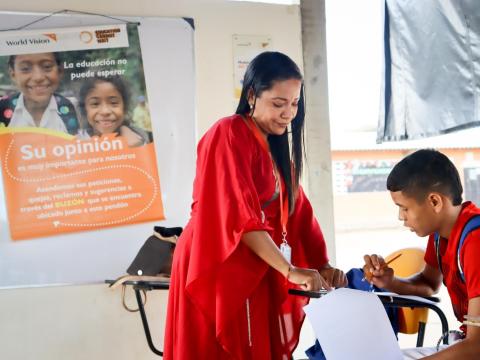Highlighting the work of Teachers in Child Development

By Barbara Melo and Mayerly Sanchez at World Vision Colombia
World Vision Colombia commemorates Teacher's Day by thanking the dedication and commitment of the teachers who educate hundreds of children in all the vulnerable communities of the country.
According to the Statistical Analysis Report #79 LEE of the Pontificia Universidad Javeriana: Characteristics and Challenges of Rural Education in Colombia, approximately 42% of teachers occupy provisional positions in the different villages and territories far from the big cities.
A large part of this group, despite not having the same professional incentives as those working in urban areas, use their teaching skills so that thousands of children in vulnerable communities affected by the armed conflict, migration or lack of access to school, can learn and have a formal academic process.
In rural areas, according to DANE's 2022 National Quality of Life Survey (Encuesta Nacional de Calidad de Vida -ECV), 9.2% of the population over 15 years of age does not know how to read and write. This is a challenge that still needs to be faced and improved in order to reduce illiteracy rates in the country, especially in rural areas, but it also encourages to accompany and alleviate the burdens of educational institutions, including teacher welfare.
The humanitarian organization World Vision has within its strategy the development of the capacities of children and their communities by prioritising education so that they can access and remain in the educational system, closing gaps. That is why on Teacher's Day, commemorated on 15 May in Colombia, teachers are recognised as a fundamental part of the development of children, especially in the most vulnerable places.
The 'Education Cannot Wait' project, financed by Education Cannot Wait, managed to improve the conditions, permanence and educational relevance of more than 13,100 participants in its last year of implementation in 2023, which included teacher welfare workshops for hundreds of teachers from educational institutions located in La Guajira, Antioquia and Norte de Santander.
These were spaces for teachers to express their concerns while learning about the methodology of tender parenting: a method that seeks to ensure that the first relationship between child and caregiver is free of violence and full of love, while serving as a model for the other relationships that the child will cultivate and expand with peers and significant adults throughout his or her life.
World Vision is grateful to all the teachers who continue to accompany children in emergency zones, migrant children and all those in vulnerable communities guaranteeing the right to education.